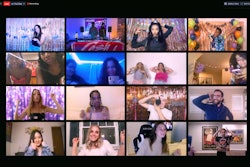
Liesl Leary-Perez is the vice president of corporate marketing at virtual event platform Hubilo.
As event marketers, we spend a lot of time asking ourselves, "What does our audience want?" Nailing the answer to that question can mean the difference between a memorable, successful event and one that leaves attendees and exhibitors underwhelmed and uninspired. The simple answer? A personalized experience.  Liesl Leary-Perez, VP of Corporate Marketing, HubiloPhoto: Courtesy of Hubilo
Liesl Leary-Perez, VP of Corporate Marketing, HubiloPhoto: Courtesy of Hubilo
Brands from Starbucks to Amazon serve those who use their site's customized deals and products their previous activity predicts they’ll engage with. Spotify gives us music recommendations based on our previous listening habits. Netflix offers previews of shows each viewer will find binge-worthy. Much like our social media feeds provide us with news and content based on our previous interactions, audiences expect to see what’s most relevant to them. They want tools that tell them what to watch, what to buy, what to listen to and who to follow to help sort through the vast sea of information available. (The personalized content experience is so ubiquitous that even cars are personalizing the driving experience based on the driver’s style of driving.)
The personalized experience, not necessarily a return to in-person, is what audiences expect from post-pandemic division meetings, sales training, trade shows and even art openings or concerts. Considering that 79% of U.S. marketers generate sales using event marketing, creating a strategy to personalize the event for attendees increases the likelihood of success.
WHERE TO START
One huge opportunity the pandemic gave marketers was the digital transformation of events on a mass scale, providing insight into how audiences behave, what they actually do, and what and who they engage with. Inviting participants to gather virtually gives event organizers the chance to personalize the event experience and content using advanced and specially tailored algorithms, which are constantly scanning and organizing attendee information.
Actively engage your audiences to actually get the personalized data you need.
Events were built to gather crowds, not necessarily to engage individuals. Hence, event success was really measured only by the number of registrations and ROI. But with digital events, when attendees of an event engage with sponsors, each other and speakers, they indicate their personal preferences and enable marketers to deliver an experience that can engage every attendee with relevant information.
The more event organizers engage their audience with interactive features—like push notifications, leader boards and other gamified content such as contests—the more data is available to really understand attendee behavior and preferences. From registration to check-in to individual sessions, event pros can spot patterns and derive trends to improve the overall experience and give attendees what they individually want.
Use event tech tools that allow you to show ROI at the same time.
Personalizing content for event participants using a virtual event platform is also a great way to justify partner ROI. Using the data collected during the event, organizers can showcase metrics that demonstrate the value of the event. From metrics on sponsored banner ads to the data on booth traffic, event marketers need to be able to show who attended, what actions they took and track leads end to end.
Further insight can be gained from a virtual or hybrid event by integrating marketing tech tools like Hubspot or Marketo into the event platform. This way, organizers can use what they learned about participants at the event to tailor future outreach to their interests. These personalized suggestions are guaranteed to appeal to attendees and encourage them to interact more with the event.
Curate relevant, compelling content for your attendees.
Content is how an attendee experiences a brand. And event content is really just a form of content—just more engaging than static information. But like all content, when so much is available, it’s easy to ignore. This is why, to be irresistible, the event experience and every brand experience must offer quality content that's relevant and tailored to the individual attendee.



















